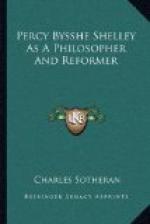To Shelley’s able advocacy, and to his appeals against the stamping out of political and social truths opposed to custom, particularly the celebrated letter to Lord Ellenborough, it cannot be denied that the toleration now enjoyed in Great Britain owes much.
Shelley was one of those who most earnestly deprecated punishment by death. In his early years, if a man stole a sheep, or shot a hare, committed forgery or larceny, was a recusant catholic or a wizard, there was, on his conviction, but one penalty meted out—death. To Shelley’s sensitive nature, this painted and tinged everything around him with an aspect of blood. In one of his political pamphlets, summoning all his energies, he depicts in fearful colors, the depraved example of an execution—how it brutalized the race, and how it was the duty of man not to commit murder on his fellow-man, in the name of the laws. The abolition of the first of these, he stated that reformers should propose on the eve of a great political change. He considered that the punishment by death harbored revenge and retaliation, which legislation should be the means of eradicating, and he urged that
“Governments which derive their institutions from the existence of circumstances of barbarism and violence, with some rare exceptions, perhaps, are bloody in proportion as they are despotic, and form the manners of their subjects to a sympathy with their own spirit.”
In England, as in many other countries, capital punishment is now only employed on conviction of murder or high treason. In Spain and Italy it was totally abolished, on the foundation of their young republics. Thus have the labors of Shelley, and other reformers for the good of humanity, aided to extinguish crime made law.




